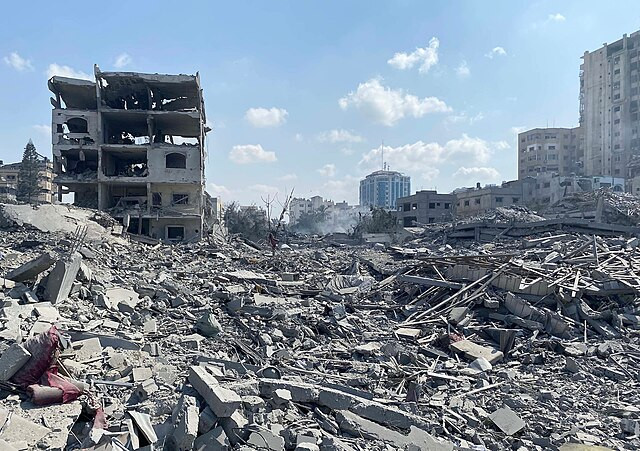An Israeli missile struck a tent encampment in southern Gaza on Tuesday, killing at least 29 people, most of whom were women and children. The attack occurred as displaced individuals gathered to watch a football match at a school in Abassan, east of Khan Younis, according to eyewitnesses and Palestinian officials.
Eyewitnesses described a scene of chaos and devastation. "They were watching a football match. There were injuries and martyrs. I witnessed this...people thrown around and body parts scattered, blood," said Ghazzal Nasser, a young woman from Abassan, speaking to Reuters. "Everything was normal. People were playing, others were buying and selling food and drinks. There was no sound of planes or anything."
The Israeli military stated it was reviewing reports that civilians were harmed in the strike. The military claimed that the missile targeted a Hamas fighter involved in the October 7 raid on Israel, which had ignited the ongoing conflict. However, the military did not immediately address whether it was aware that a football match was taking place at the time of the strike.
At Nasser Hospital in Khan Younis, the aftermath of the strike was painfully evident. "The schools were overcrowded with people and the street was full too, suddenly a missile hit and destroyed the whole place," said Asmaa Qudeih, who lost relatives in the attack. "Bodies flew in the wind, body parts flew, I don't know how to describe it."
Israel Bombs Youth Soccer Game at School in Gaza, Killing 'at Least 31 People' https://t.co/A5VzY7Qsx0 — Stawicki Photography (@StawickiPhotog) July 11, 2024
The attack has intensified the already dire humanitarian situation in Gaza. Leaflets dropped on Gaza City on Wednesday urged civilians to evacuate, marking "safe routes" for their departure. However, the Israeli military's continued operations in Gaza City against Hamas and Islamic Jihad militants have made these routes perilous. The Palestinian Red Crescent reported receiving numerous desperate calls from residents trapped in their homes, with rescue teams unable to reach them due to the intensity of the bombing.
In Jerusalem, Israeli Prime Minister Benjamin Netanyahu met with U.S. Middle East envoy Brett McGurk, expressing commitment to a Gaza ceasefire deal provided Israel's conditions were met. Hamas has accepted a key part of a U.S. plan aimed at ending the conflict, dropping a demand that Israel first commit to a permanent ceasefire. However, Netanyahu insisted that the deal must not prevent Israel from resuming fighting until its objectives are achieved.
The recent airstrike is the fourth on or near schools sheltering displaced Palestinians in four days. The head of the UN's refugee agency UNRWA, Philippe Lazzarini, condemned the attacks on schools, stating, "Schools have gone from safe places of education and hope for children to overcrowded shelters and often ending up a place of death and misery." He added that two-thirds of UNRWA's schools in Gaza had been targeted since the start of the conflict.
The ongoing violence has had a devastating impact on Gaza's civilian population. Health officials in the Hamas-run territory report that more than 38,000 Palestinians have been killed since the war began. The conflict erupted on October 7, when militants led by Hamas infiltrated southern Israel, killing 1,200 people and taking around 250 hostages, according to Israeli figures.
Despite the humanitarian crisis, the Israeli military continues its offensive, with Defense Minister Yoav Gallant claiming that 60% of Hamas fighters have been killed or wounded as a result of the operations. In the central Gaza camp of Al-Nuseirat, an airstrike on a house killed six Palestinians, including children, while another airstrike in Khan Younis resulted in additional casualties.






